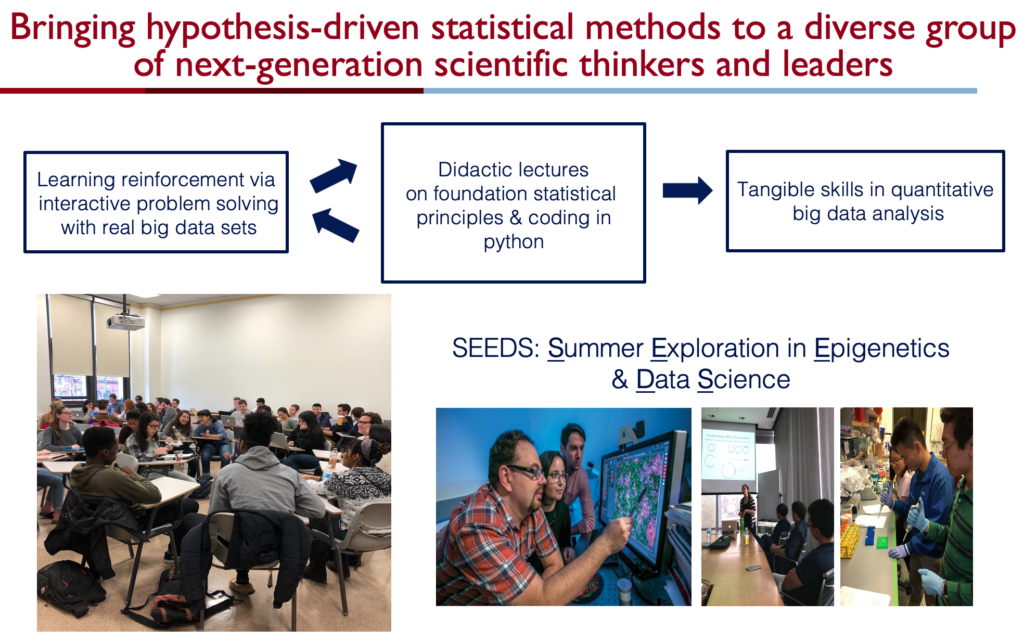
The Cremins lab’s outreach goals are to train and empower a diverse group of next-generation scientific leaders to find biologically meaningful and statistically rigorous patterns in high-dimensional epigenetics datasets by integrating cutting-edge computational and experimental approaches.
To achieve this goal, we have pursued depth in three purposeful outreach activities:
- SEEDS (Summer Exploration in Epigenetics and Data Science): We created an intensive, multi-year interdisciplinary training program for undergraduate students in high-throughput biological data generation and analysis. The SEEDS program offers 4-5 undergraduate students from under-represented communities a four-year sequence of summer bootcamp training modules in first principles of statistics, computer science, molecular biology, and epigenetics. Students apply their knowledge to a hypothesis-driven research question in spatial neuroepigenetics, each year growing in mastery over their combination wet/dry lab project, culminating in paper submission and poster presentation at a conference.
- SEEDS-BRIDGE: Actively partner with established underrepresented minority groups to identify post-baccalaureate candidates from historically disadvantaged socio-economic backgrounds with strong interest in science. Our lab has a track record of recruiting students during their undergraduate training into the postbaccalaureate arm of our SEEDS program (SEEDS-BRIDGE). Given their established expertise in fostering community among under-represented groups, we strategically partner with (1) the Penn FGLI (First-Generation Low-Income) program (https://gic.universitylife.upenn.edu/fgli/) and (2) APSA (the American Physician Scientist Association; https://www.physicianscientists.org/). We work with FGLI and APSA to find students who have lived through severe socio-economic life experiences. Our target candidates have strong interest and ability in science yet lack the access to connections and resources necessary to pursue long-term careers in science, engineering, or medicine. Through SEEDS-BRIDGE, we provide students a 2-year post-baccalaureate position to build depth/breadth in scientific training and a network of mentors to build confidence and interest in long-term research careers.
- Develop new undergraduate and graduate Structured Active In-class Learning (SAIL)-based courses to equip students with fundamental concepts in probability, statistics, and coding to find patterns in spatial epigenetics data sets. Students learn statistical principles by solving biomedical research problems with real-world genomics data. Dr. Cremins has designed and taught undergraduate (EM375) and graduate (BE504) courses focused on this goal since 2014 at Penn, exemplifying in word and deed for the engineering community that women raised in economically-disadvantaged backgrounds can thrive in computationally-intensive, quantitative scientific disciplines over the long-term.
All 15 graduates of our SEEDs/SEEDs-BRIDGE programs remain in scientific careers (PhD (MIT-1/UPenn-4/), MD-PhD (Mayo-1/UCSF-1/NYU-1), and MD (OhioState-1/UMich-1/Harvard-1/UPenn-1/Jefferson-1), and Other(Technician-1/Biotech-1). We are currently mentoring 3 SEEDs students from UPenn, Binghamton, and Cal Berkely. We commit as mentors for life to each individual.
